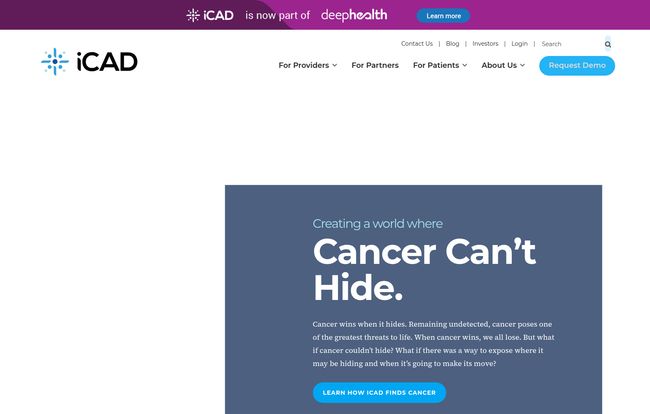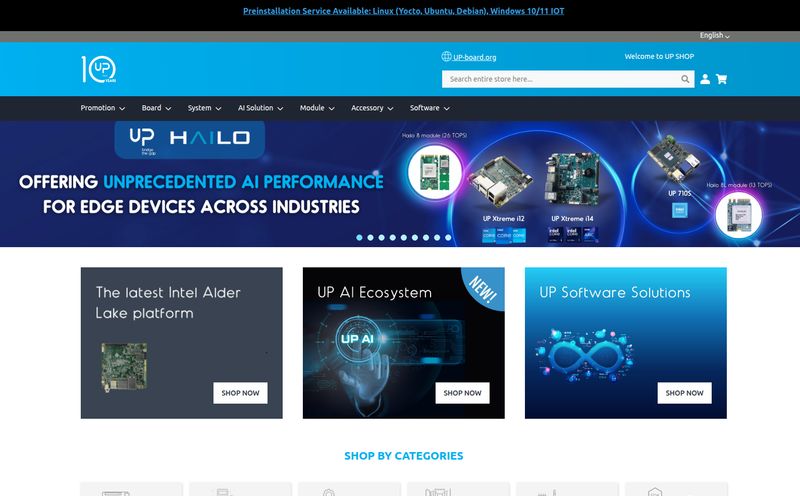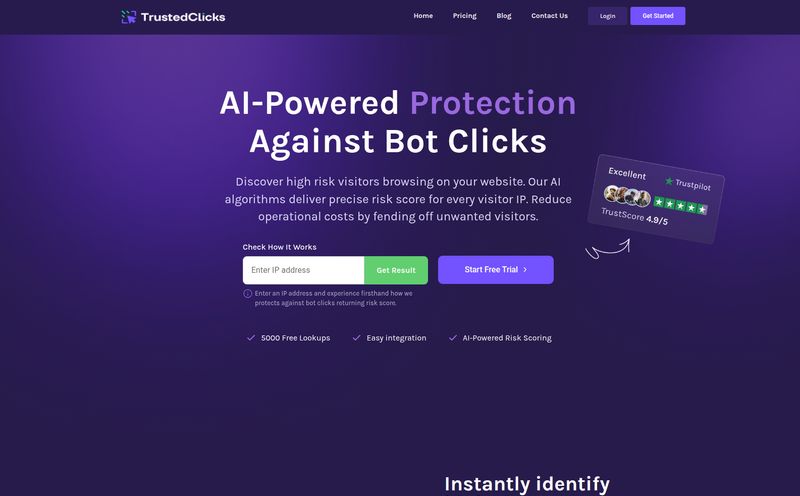I spend most of my days hunting for things. Keywords, traffic trends, algorithm loopholes… you name it. It's a digital treasure hunt, and when you find that perfect, low-competition keyword, it feels like striking gold. But recently, I stumbled onto a different kind of “search” tool, one that’s not looking for SERP rankings, but for something infinitely more important. I’m talking about iCAD and their ProFound AI Breast Health Suite.
Honestly, I'm a tech and data guy, not a doctor. But the principles of using advanced systems to find patterns in massive datasets? That’s my language. And what iCAD is doing with AI in the medical field… well, it got my attention. They’re on a mission to create a world where “cancer can’t hide.” A bold statement, for sure. So I decided to put on my analyst hat and see what’s under the hood.
So, What Exactly is the iCAD ProFound Breast Health Suite?
At its core, iCAD offers a set of AI-powered tools designed to help radiologists do their job better and faster. Think of it less like a robot doctor and more like a brilliant, eagle-eyed assistant who never gets tired. This isn't about replacing the human expert; its about augmenting their skills. The suite is built on three main pillars: finding cancer, assessing breast density, and evaluating a patient's personal risk.
For years, mammogram interpretation has been an incredible skill, but one that’s also subjective and incredibly demanding. A radiologist might look at hundreds of images a day. That’s a massive cognitive load. iCAD’s AI essentially pre-reads these scans, flagging suspicious areas that warrant a closer look. It’s a second set of digital eyes that helps catch things that the human eye might miss, especially on a long Tuesday afternoon.

Visit iCAD
The Power of an AI Co-Pilot in the Reading Room
Let’s get down to the brass tacks. Why is this such a big deal? According to iCAD’s own data and clinical studies, the benefits are pretty compelling. One of the biggest claims is that their tools help radiologists find more invasive cancers earlier. And in the fight against cancer, “earlier” is probably the most powerful word in the dictionary.
Beyond that, there's a huge efficiency play. The platform can apparently reduce reading time for radiologists by a significant margin. If you’ve ever run a business, you know that time is money. In a hospital setting, time means more patients can be seen, and experts can focus their energy on the most complex cases. It streamlines the whole workflow, which is something we can all appreciate. Nobody likes a bottleneck, whether it’s in a content production pipeline or a patient care pathway.
"Improving patient outcomes and saving lives by helping radiologists find more invasive cancers earlier..."
That right there is the bottom line. It’s not just about making a process slicker; it’s about the tangible, human impact.
More Than Just a Spot-the-Difference Game
The ProFound suite isn’t a one-trick pony. It goes deeper than just basic detection, and this is where I think it gets really interesting.
Getting Objective About Breast Density
Anyone familiar with breast health knows that breast density is a huge factor, both in masking potential cancers and as an independent risk factor. The problem? Historically, assessing density has been pretty subjective. What one radiologist calls a “C,” another might call a “D.” iCAD’s AI provides an objective, reliable density score based on the BI-RADS® 5th Edition standards. This consistency is a game-changer. It ensures every patient is evaluated on the same scale, every single time. That kind of standardization is the foundation of good data and good medicine.
A Glimpse into the Future with Risk Evaluation
This part is fascinating. The ProFound AI Risk tool takes a mammogram and, within that single exam, calculates a woman's short-term risk of developing breast cancer. It's reportedly more accurate than traditional models, like the Tyrer-Cuzick model, which rely on personal and family history questionnaires. This AI looks at the actual biology and tissue patterns in the mammogram to generate a risk score. It’s a shift from generalized statistical risk to truly personalized risk assessment.
The Real-World Hurdles and Practicalities
Okay, this all sounds great. But as anyone who's ever tried to implement a new enterprise software knows, the sales pitch is always shinier than the reality of integration. iCAD promises “seamless workflow integration,” and they offer flexible deployment options, which I assume means on-premise or cloud-based solutions. That's good, because every hospital and imaging center has its own unique tech stack and security protocols.
However, it’s not a magic wand. There are some important caveats. The ProFound AI Risk tool, for instance, isn't fully FDA Cleared yet; it's available in the US for investigational use. That’s a critical detail. It means it’s cutting-edge, but also still proving itself in the field. Additionally, these products aren't available in every country, so global access is still a work in progress.
And what about the cost? Well, here’s where my investigation hit a bit of a snag. The pricing page on their site seems to lead to a 404 error, a “Page Not Found.” A familiar sight for an SEO guy, but a bit frustrating for a potential customer. I’d imagine a system this sophisticated is a significant investment, likely sold with custom quotes rather than a simple subscription fee. But a little more transparency would be nice.
Why This Matters More Than Your Bounce Rate
I spend my life obsessing over metrics. Time on page, conversion rates, domain authority... But looking at a tool like iCAD is a healthy dose of perspective. We talk a big game in tech about “changing the world,” but often that just means making it easier to order a pizza or share a cat video.
This is different. This is AI being applied with a clear, focused, and profoundly human purpose. It’s not about replacing the warmth, empathy, and deep expertise of a medical professional. It’s about giving them a better tool, a sharper lens, so they can do what they do best: save lives. I've seen a lot of AI hype over the years, and most of it is just that—hype. But this feels grounded, necessary, and real. It's a reminder that the most powerful technologies are the ones that serve our most fundamental human needs.
Frequently Asked Questions About iCAD
So what is iCAD in simple terms?
iCAD is a medical technology company that develops AI software to help radiologists detect breast cancer earlier and more accurately from mammograms. They also offer tools to assess breast density and predict future cancer risk.
How does the AI actually improve cancer detection?
The AI is trained on millions of mammogram images. It learns to identify subtle patterns that might indicate a malignancy. It then flags these areas for the radiologist, acting as a second reader to improve detection rates and reduce the chances of a cancer being missed.
Is the iCAD ProFound suite fully FDA Cleared?
It's a bit mixed. The ProFound Detection and Density Assessment solutions are FDA Cleared and have a CE Mark. However, their ProFound AI Risk tool is currently available in the U.S. for investigational use only and is not yet FDA Cleared for clinical use, though it is CE Marked and Health Canada Licensed.
Does this AI technology replace radiologists?
Absolutely not. This is a common misconception about medical AI. The technology is a decision-support tool, not a replacement for a doctor. The final diagnosis and patient care decisions are always made by the human radiologist, who uses the AI's findings to inform their expert judgment.
Who uses iCAD’s technology?
Their primary users are radiologists, hospitals, and imaging centers around the world. The company partners with these healthcare providers to integrate the AI into their existing mammography workflows.
Can I find out how much iCAD costs?
Unfortunately, pricing isn't publicly available on their website. For technology of this scale, pricing is almost certainly customized based on the institution's size, volume, and specific needs. You would need to contact iCAD directly for a quote.
Final Thoughts
Looking at iCAD has been a refreshing detour from my usual digital marketing grind. It's a powerful example of AI moving beyond hype and into a role of tangible, life-altering support. While there are still hurdles like regulatory approvals for newer features and questions around accessibility and cost, the direction is incredibly promising. It’s not just about better data or more efficient workflows; it's about giving medical professionals the best possible tools in the ongoing fight against cancer. And that's a trend we can all get behind.
References and Sources
- iCAD Official Website
- RadiologyInfo.org - BI-RADS for Mammography
- National Cancer Institute - Breast Cancer Risk Assessment Tool (for general context on risk models)



